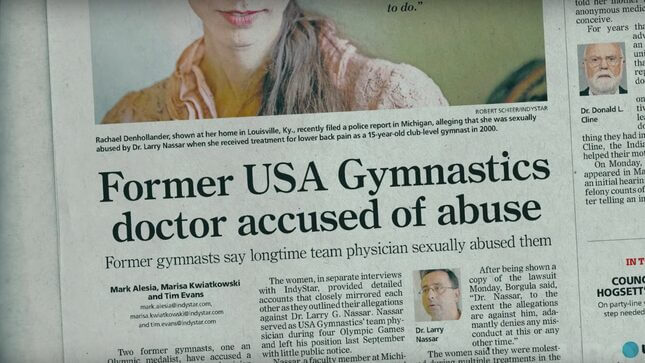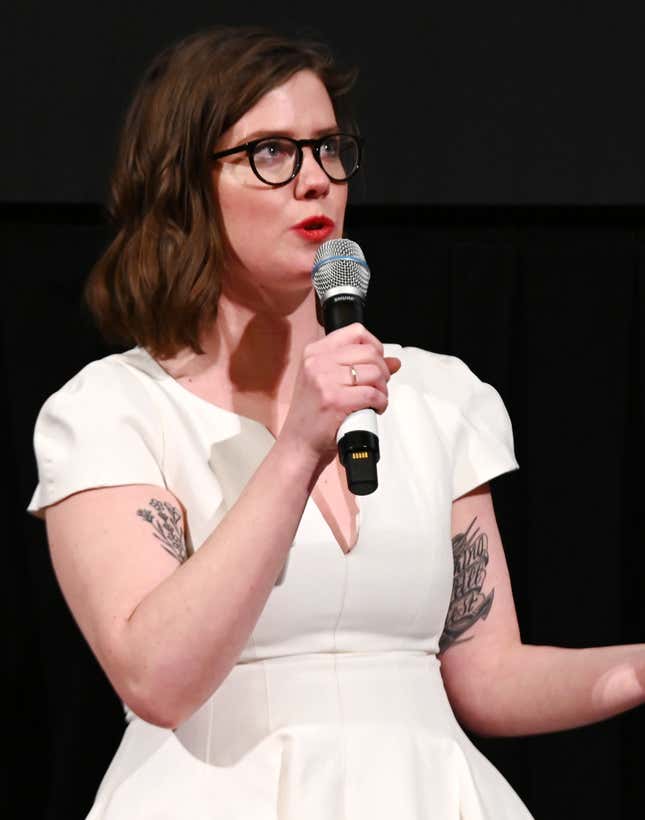Director Erin Lee Carr On Her Gymnastics Abuse Documentary At the Heart of Gold
Entertainment
Screenshot: Array
In 2018, Larry Nassar, the former, beloved doctor for the USA Gymnastics and the Michigan State athletics department, was sentenced to 40 to 175 years in prison for sexually abusing over a hundred young women and girls who came under his care from MSU students to Olympic athletes.
But Nassar worked within a large system, filled with adults who either turned a blind eye or outright ignored girls who voiced their abuse. It’s that system and the voices of the numerous gymnasts and athletes who rose above it that get the spotlight in At the Heart of Gold, director Erin Lee Carr’s documentary about the Nassar trial and abuse within Olympics gymnastics, premiering on HBO May 3. In speaking with dozens of women, Carr focuses on Nassar’s abuse but also goes beyond it to shine a light on how elite gymnastics essentially silences the young girls who practice it, in a constant push on their bodies and minds to submit to pain. It’s a brutal but respectful documentary, one that demands a completely different approach to how young women become professional gymnasts and how they’re cared for.
Jezebel spoke with Carr about interviewing gymnasts for her film, how to approach a subject like this with radical empathy, and the problems with Olympic gymnastics. Our conversation has been condensed and edited for clarity.
JEZEBEL: You started working on this documentary in 2017, before the MeToo movement broke and before news of Larry Nassar’s abuse broke widely across the country. How did MeToo change the shape of this documentary?

ERIN LEE CARR: I think that the film is really a product of MeToo and being a part of a MeToo era in that it exhibits a form of radical empathy, some might call it emotional awareness. You hear someone like me who’s the filmmaker, who’s not on screen, but I’m interviewing every single gymnast and not consoling them but talking them through this. I think there was in years past the sort of Barbara Walters, very formal style of interviewing, but I know what it’s like to go through something difficult, and I wasn’t going to pretend. I’m not a sexual abuse survivor, but I wanted the person who I was interviewing to feel like they were in a safe spot, and I wanted the audience to directly listen to them. That was something that definitely changed in my interviewing style and how I set about making this film, because there was sort of a reckoning happening with how we think about who is a victim and who is a survivor and what that means.
You mentioned radical empathy. How would you define radical empathy as a filmmaker?
It really is about listening, about being open, about understanding trauma and thinking thoughtfully about it, and not asking those terrible questions like, “Did you talk to your parents about it?” Or, “Did you tell the police? There’s sort of a tenor when it comes to that, that is accusatory and so not participating in anything like that felt really important.
“It wasn’t ever going to be sensationalized, but I always feared exploiting the story…”
What was your guiding ethos in talking to these gymnasts? How do you make sure you don’t re-traumatize them and sensationalize their stories?
-

-

-

-

-

-

-

-

-

-

-

-

-

-

-

-

-

-

-

-

-

-

-

-

-

-

-

-

-

-

-

-

-

-

-

-

-

-

-

-








































